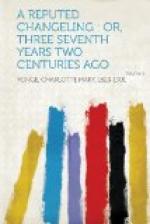CHAPTER I: THE EXPERIENCES OF GOODY MADGE
“Dear Madam, think me not to blame;
Invisible the fairy came.
Your precious babe is hence conveyed,
And in its place a changeling laid.
Where are the father’s mouth and nose,
The mother’s eyes as black as sloes?
See here, a shocking awkward creature,
That speaks a fool in every feature.”
Gay.
“He is an ugly ill-favoured boy—just like Riquet a la Houppe.”
“That he is! Do you not know that he is a changeling?”
Such were the words of two little girls walking home from a school for young ladies kept, at the Cathedral city of Winchester, by two Frenchwomen of quality, refugees from the persecutions preluding the Revocation of the Edict of Nantes, and who enlivened the studies of their pupils with the Contes de Commere L’Oie.
The first speaker was Anne Jacobina Woodford, who had recently come with her mother, the widow of a brave naval officer, to live with her uncle, the Prebendary then in residence. The other was Lucy Archfield, daughter to a knight, whose home was a few miles from Portchester, Dr. Woodford’s parish on the southern coast of Hampshire.
In the seventeenth century, when roads were mere ditches often impassable, and country-houses frequently became entirely isolated in the winter, it was usual with the wealthier county families to move into their local capital, where some owned mansions and others hired prebendal houses, or went into lodgings in the roomy dwellings of the superior tradesmen. For the elders this was the season of social intercourse, for the young people, of education.
The two girls, who were about eight years old, had struck up a rapid friendship, and were walking hand in hand to the Close attended by the nurse in charge of Mistress Lucy. This little lady wore a black silk hood and cape, trimmed with light brown fur, and lined with pink, while Anne Woodford, being still in mourning for her father, was wrapped in a black cloak, unrelieved except by the white border of her round cap, fringed by fair curls, contrasting with her brown eyes. She was taller and had a more upright bearing of head and neck, with more promise of beauty than her companion, who was much more countrified and would not have been taken for the child of higher station.
They had traversed the graveyard of the Cathedral, and were passing through a narrow archway known as the Slype, between the south-western angle of the Cathedral and a heavy mass of old masonry forming part of the garden wall of the present abode of the Archfield family, when suddenly both children stumbled and fell, while an elfish peal of laughter sounded behind them.
Lucy came down uppermost, and was scarcely hurt, but Anne had fallen prone, striking her chin on the ground, so as to make her bite her lip, and bruising knees and elbows severely. Nurse detected the cause of the fall so as to avoid it herself. It was a cord fastened across the archway, close to the ground, and another shout of derision greeted the discovery; while Lucy, regaining her feet, beheld for a moment a weird exulting grimace on a visage peeping over a neighbouring headstone.




